Abstract
A field experiment with bell pepper (Capsicum annuum L.) cv. Wizard X3R was established (May 2004) in Citra, Marion Co., Fla. The objective was to compare soil-borne disease development among six soil management treatments: cowpea (Vigna unguiculata (L.) Walp.) summer cover crop, solarization on a raised bed, solarization on a flat surface, cowpea cover crop followed by raised bed solarization, methyl bromide fumigation, and untreated control. Pepper seedlings were planted on 31 August and were monitored for mortality on weekly intervals until maturity. Hurricane Frances (5, 6 September) released 41 cm (16 inches) of rain in 24 hours resulting in a severe epidemic of Pythium spp. throughout the field. After this event, mortality of pepper seedlings was greatest (P 0.05) in the two treatments involving cowpea cover crops. The extra organic matter in the treatments with cowpea likely increased the mortality levels. However, after Hurricane Jeanne (26 September), the plants in the methyl bromide (16.5% mortality) treatment had nearly twice the mortality as those in the flat solarization (8.8% mortality) treatment showing a continuing trend throughout the season. Regardless of treatment, plants in the south end of the field had higher mortality (P 0.05) than those in the north end, consistent with the slight grade from north to south. These results illustrate that subtle field differences such as gradation or water flow can affect inoculum distribution, resulting in mortality. In addition, extreme weather events may adversely affect expectations of various treatments such as the methyl bromide and the cowpea treatments that were not effective against this epidemic.

